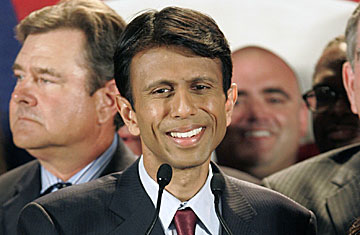
Louisiana Republican gubernatorial candidate Bobby Jindal claims victory in Louisiana's governor's race in Baton Rouge, La., October 20, 2007.
In a widely expected victory Saturday night, Bobby Jindal, a 36-year-old Republican Congressman, won the Louisiana gubernatorial election, becoming the nation's first governor of Indian-American descent and the youngest chief executive of any state. Jindal took 54% of the vote in the state's off-year open primary, the first since Hurricane Katrina in August 2005, and became the first non-white politician to hold the state's highest office since Reconstruction. Jindal, one of the few young rising stars in the G.O.P. ran on a strong reform platform. "Don't let anyone talk badly about Louisana," he said during his Saturday night victory speech at a Baton Rouge Holiday Inn. "Those days [of corruption and incompetence] are officially over. There has never been a clearer mandate for our state."
For a while on election night, it wasn't particularly clear which was the more exciting match-up: At the front of the ballroom, a crowd watched Jindal's results flashing on giant screens as they continued to rise, while in the back, pockets of people stood cheering at the LSU-Auburn game. In a region where college football is a religion, there was concern in the Jindal campaign about low turnout at the polls due to the game. At the end of the night, however, Jindal took almost 700,000 votes, the highest ballot numbers for a for a non-incumbent primary candidate in recent history. With a vote over 50 percent, Jindal was able to avoid a Nov. 17 runoff election.
Jindal, the son of Indian immigrants, is generally acknowledged to be an ambitious policy whiz kid. An Ivy League-educated Rhodes Scholar, he was appointed head of the Louisiana Department of Health and Hospitals, the state's largest agency, at the tender age of 24. At 28, he was tapped to head one of Louisiana's university systems. Two years later, he served in the Bush Administration as an assistant secretary in the Department of Health and Human Services. He first ran for governor in 2003 at the age of 32, losing by a mere four percentage points to current Democratic Governor Kathleen Blanco. That defeat was attributed to his relative lack of elective experience and the potential racial discomfort in the state's rural north. Blanco, whose fortunes fell rapidly after the perceived bungling of her administration during and following Katrina, decided not to run for reelection, leaving the race open for Jindal, who led the field practically since he announced his candidacy.
Following his defeat in 2003, Jindal ran for and won the congressional seat in Louisiana's first district. Since then, the staunch conservative — who converted from Hinduism to Catholicism as a teenager — has traveled often to northern Louisiana, hitting up churches and pressing the flesh. The strategy appears to have worked, as Jindal handily won the areas he lost to Blanco four years ago and that heavily supported white supremacist David Duke's bid for the governorship in 1991. Perhaps realizing the difficulties of running to lead a state that has by and large elected white males to higher office, Jindal worked to minimize the significance of his ethnicity on the trail, using variations on the theme of, "the only colors that should matter are red, white and blue."
And in a state that has long been stereotyped as corrupt and supportive of the good ol' boy system, Jindal's victory is a sign that maybe, if the state is ever going to be turned around, now is the time to do it. He has vowed to call a special session of the legislature shortly after his inauguration to "pass ethics reforms with real teeth" and has promised to institute a variety of 10- to 31-point plans that reflect his policy wonkiness. As he put it on Saturday: "The rest of the country, keep your eyes on Louisiana." You should probably keep your eyes on Bobby Jindal, too.
